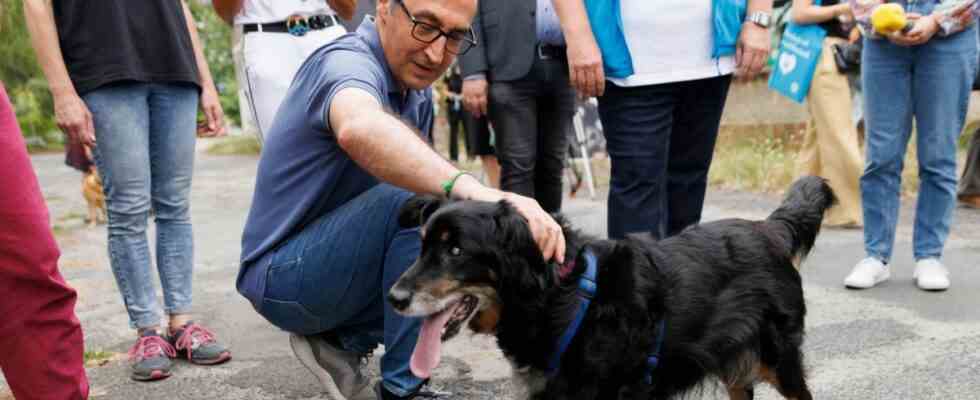While Federal Minister of Agriculture Cem Özdemir (Bündnis 90/Die Grünen) was walking through the cat house of the Animal shelter at the Brandenburger Falkensee being led, someone unnoticed ties a Labrador to a tree in front of the facility. And goes. Perhaps this animal too was taken in and disrupting during the pandemic, now that normal life is back. Or the costs for the veterinarian, food and care were just too much because the owners are barely able to make ends meet themselves.
Animal shelter manager and club chairman Heike Wegner and her team will probably never know the exact reasons. But they’ve learned over the years why people abandon or give up their pets. In the last 72 hours there were seven animals in the Falkenseer home alone. That is why today’s visit by the Federal Minister is so important for them. Your message to Özdemir this Monday afternoon is clear: you are afraid of the coming winter.
Animal rights activists fear that people will now have to see where they are
The green Minister of Agriculture stands in jeans and a t-shirt in the tiled low-rise building of the animal shelter and looks through a window at a one-eyed cat. She has been here since April, her life and that of the other 100 animals can only be financed thanks to donations. Did they decrease during Corona? Well, says Wegner, not significantly. But that will probably change because “due to inflation, people first have to see where they are.”
It’s a tough situation for animal shelters across Germany. The prices for animal feed are rising more and more and when it gets colder, many homes don’t know how to pay for the heating costs for the mostly dilapidated buildings. In addition, there are higher costs for feed and for veterinarians due to the planned adjustment of the fee schedule. And the upcoming increase in the minimum wage in autumn will also affect the homes. In Falkenberg, that probably means that one in four employees will have to be laid off. That means more work for the volunteers.
It is possible that half of the animal shelters will soon have to impose a freeze on admissions
Since the beginning of the pandemic, the German Animal Welfare Association, to regulate the keeping of pets, to ban online trading in animals and to introduce a mandatory certificate of competence for pet owners. Many of the animals that come to the shelter as indirect corona victims – acquired during the lockdown and have now become a nuisance – are also puppies from transports that violate animal welfare. They are particularly care-intensive. “We expect that half of the German animal shelters will have to freeze admissions by the end of the summer,” says Thomas Schröder, President of the German Animal Welfare Association. He is therefore very happy about Özdemir’s visit.
The costs for veterinarians and feed are rising, the heating costs for often dilapidated buildings, and the higher minimum wage from autumn is hitting animal shelters like the one in Falkensee hard.
(Photo: INA FASSBENDER/AFP)
He walks a dog, talks about his own experiences with pets and is on first-name terms with the staff of the home from the start. By the way, the abandoned Labrador is now called Cem. The minister promises to be involved in talks with the leading associations. In the new coalition agreement, agreement was reached on a consumer foundation, with the help of which money should reach the homes. But before 2024 that will probably not happen. Improved framework conditions could also help. So far, many municipalities have avoided financial support for their animal shelters.
But as Minister of Agriculture, Özdemir currently has a lot of other work to do: Since Russia invaded Ukraine, European agricultural policy has also been upside down. Where areas should just be protected, the pressure for additional wheat production is now growing. the African swine fever rampant in northern Germany. And Özdemir actually wants to clear out the German stables. However, the war in Ukraine puts the ecological, climate-friendly change in agriculture – for which Özdemir actually stands with his feet wide – in question on many points in all harshness.

